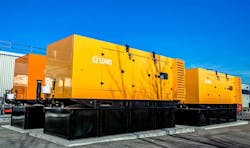ROOT Data Center Will Use AI to Monitor its Generators
Artificial intelligence has moved to the front lines of data center uptime. ROOT Data Center announced today that it is teaming with LitBit to use artificial intelligence (AI) to monitor the emergency backup generators, marking the first use of AI technology to reduce the risk of outages.
“We believe we are the first data center in the world to use AI for reliability,” said AJ Byers, the CEO of ROOT Data Center, which operates two facilities in Montreal.
In previous data center projects, AI has been used to improve data center efficiency by fine-tuning systems to respond to changes in weather or workloads. LitBit, a startup founded by industry veteran Scott Noteboom, envisions a broader role for AI in managing data center operations, and ROOT will mark the first use of its “personas” in a production data center.
LitBit’s AI technology can analyze sound and video at a granular level. The company has developed intelligent agents to monitor a data center environment, and send alerts when a change is detected.
“With LitBit’s technology, we can develop engineering personas that can be like having an employee standing next to the generator,” said Byers. “We’ve created a generator persona by training the LitBit technologies to understand our generators’ normal operating sound, and if there’s any deviation, it can alert by notifying our NOCs (network operations centers).
“We put a microphone inside the generator enclosure, and it’s listening for any potential mechanical problem,” said Byers. “It can hear a squeal or knock or a bearing going out of place. I think for the purpose of sound analysis, (AI) may be better than humans.”
Byers compares the sound-based anomaly detection to VESDA (Very Early Smoke Detection) technology, which uses lasers to sample air quality and can detect smoke before it is visible to the human eye.
“We think this is another way to bring best-of-breed technology to increase the reliability of our data centers,” said Byers. “We’ve made 100 percent uptime a top priority, and working with Litbit, we’ve pioneered the next wave of machine learning within data center operations.”
Harnessing AI for Data Center Management
LitBit is a startup from San Jose that has developed AI agents that absorb subject matter expertise and train algorithms to manage tasks in factories and data centers. LitBit says its technology will allow data center operators to use AI to scale their operations, creating agents for a variety of monitoring and management tasks. The agents can integrate with third-party services, sending messages through Slack or implementing voice commands via the Amazon Echo.
“Business is everywhere and always in the data center more than anywhere else, but people can’t be,” says Noteboom, Litbit’s CEO. “That is the promise of AI, to help provide constant and intelligent oversight of the spaces and machines in a data center to improve business outcomes. We are proud to be working with ROOT to make good on that promise.”
LitBit’s sound analytics were initially developed to monitor vivariums, massive facilities used to breed mice for scientific testing. Ultrasonic microphones were able to detect squeals that indicate mice are in stress, or fighting. Infrared cameras can watch levels in water bottles, a key maintenance task.
Scaling Monitoring to Keep Pace With Growth
ROOT Data Center leverages Quebec’s ample supply of cheap hydroelectric power, along with a rapid-deployment data center design. The company is installing the LitBit system in a data center near Montreal that currently supports 20 megawatts of tenant space, and will soon grow to 50 megawatts. The facility has 16 generators at present, and will at least double that number upon completion.
‘There’s going to be a lot of equipment in this data center,’ said Byers. “When you have a 50 megawatt data center and a lot of generators deployed, it’s not easy to support all of them.” Byers said the AI agents augment the company’s use of DCIM (data center infrastructure management) software, which is helping data centers track and manage their operations.
At present the system is reactive, responding to anomalies in generator operations. Over time, ROOT and LitBit hope the AI agents can help predict and prevent issues before they threaten the reliability of a piece of equipment.
Automation tools have a long history in data center management. Creating AI agents to perform employees’ job functions makes that worker extendable, but also replaceable. Researchers and sociologists are grappling with the workforce implications of these technologies, and their impact on employment and the job market.
Noteboom says the data center sector is an industry where AI agents can be additive, helping companies address challenges in scaling infrastructure to keep pace with torrid growth in cloud computing.
Byers emphasizes that the integration of AI into ROOT Data Center is seen as a partnership between humans and technology.
“I don’t think AI would ever replace the humans in the data center,” said Byers. “But we believe that over time we could roll out this technology to be extra eyes and ears to augment the technicians’ work. We believe the sound technology could apply to our cooling platform and perhaps even some of the electrical infrastructure. Technology can absolutely play this role.”
About the Author


